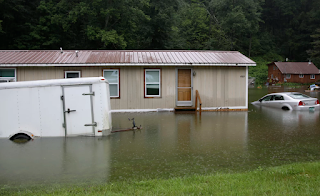American Perspectives on Climate Change: Concerns and Actions
The issue of climate change is at the forefront of many American minds, with a recent national survey by the Pew Research Center shedding light on how the public perceives this pressing concern. In this article, we delve into the key findings and sentiments expressed by Americans regarding climate change.
Widespread Concerns About Climate Impact
A significant majority of Americans recognize that climate change is affecting people in the United States today. Nearly 75% of the nearly 9,000 surveyed adults believe that climate change has real and harmful consequences. This year alone has witnessed a series of devastating weather disasters, including wildfires in Maui, a hurricane in Florida, and deadly floods.
This marks the first time the Pew Research Center has conducted such a comprehensive assessment of how Americans perceive current and future climate change impacts.
Expectations for Intensifying Climate-Driven Disasters
The survey reveals that most respondents anticipate more severe climate-driven disasters in the future. A substantial portion of participants believes that a growing number of plant and animal species will face extinction (73%), heatwaves will claim more lives in the U.S. (61%), and rising sea levels will displace large populations from coastal areas (58%).
These sentiments are substantiated by scientific research, which consistently underscores the threats posed by greenhouse gas emissions to Americans' health, finances, and overall well-being. Urgent measures to reduce fossil fuel consumption are emphasized as a means to prevent even more perilous warming. Notably, a majority of Americans (57%) expect renewable energy to play a more significant role in the nation's energy production in the coming years.
Perception vs. Local Reality
Interestingly, the survey reveals a contrast between Americans' perception of worsening climate impacts and their expectations for their own communities. While most respondents foresee increased climate impacts in the next 30 years, only 41% believe that climate change will negatively affect their local community during the same period. An equal percentage does not anticipate significant change in their community due to climate change.
This dissonance is also evident in the survey's findings regarding regions like the Southwest, coastal Florida, and Southern California, which many predict will become less desirable places to live due to climate change, despite being some of the fastest-growing areas in the country.
Generation Gap in Concern and Activism
Younger Americans emerge as more concerned about climate change and more proactive in advocating for change. Nearly 80% of young adults anticipate increasing harm from climate change over their lifetimes, compared to other age groups. This concern translates into action, as young people are more likely to donate to climate-related causes, contact elected officials about climate legislation, and participate in climate rallies. Almost one-third of individuals aged 18 to 29 report involvement in climate activism in the past year, a rate almost double that of those aged 65 and older.
Emotional Responses to Climate Change
When it comes to emotional responses, the survey highlights that Americans often feel sadness (73%) and anxiety (72%) when reading news stories or encountering climate advocacy. Frustration about the lack of political agreement on the topic is also prevalent. However, 50% of those surveyed express motivation to address climate change.
Skepticism and Mistrust
The survey reveals skepticism among 53% of Americans, particularly among Republicans, toward groups and individuals advocating for climate action. There is some mistrust regarding motivations and reasons behind these calls for change. This skepticism has been harnessed by conservative groups in some regions to oppose renewable energy initiatives.
Where to Place Responsibility
Americans generally believe that the energy industry, including oil and gas companies, and large businesses and corporations have the power to do more to combat climate change than individual citizens. Only about a quarter of respondents feel that individuals can make a significant impact. A majority of those surveyed believe that the federal government, in addition to other large companies and corporations, can contribute significantly to climate action.
In contrast, only a third of Americans are confident that the U.S. and other countries will take adequate measures to avert the most severe impacts of climate change.
As the climate change debate continues, it is clear that public perception, especially among different age groups, will play a crucial role in shaping future actions and policies.
#ClimateChangeConcerns, #AmericanAttitudes, #ClimateActivism, #EnvironmentalPerceptions, #ClimateActionResponsibility

